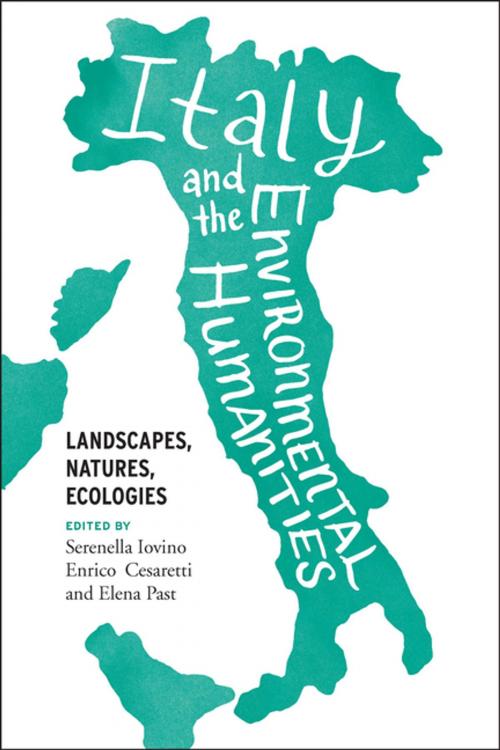Italy and the Environmental Humanities
Landscapes, Natures, Ecologies
Fiction & Literature, Literary Theory & Criticism| Author: | ISBN: | 9780813941080 | |
| Publisher: | University of Virginia Press | Publication: | March 27, 2018 |
| Imprint: | University of Virginia Press | Language: | English |
| Author: | |
| ISBN: | 9780813941080 |
| Publisher: | University of Virginia Press |
| Publication: | March 27, 2018 |
| Imprint: | University of Virginia Press |
| Language: | English |
Bringing together new writing by some of the field’s most compelling voices from the United States and Europe, this is the first book to examine Italy--as a territory of both matter and imagination--through the lens of the environmental humanities. The contributors offer a wide spectrum of approaches--including ecocriticism, film studies, environmental history and sociology, eco-art, and animal and landscape studies--to move past cliché and reimagine Italy as a hybrid, plural, eloquent place. Among the topics investigated are post-seismic rubble and the stratifying geosocial layers of the Anthropocene, the landscape connections in the work of writers such as Calvino and Buzzati, the contaminated fields of the ecomafia’s trafficking, Slow Food’s gastronomy of liberation, poetic birds and historic forests, resident parasites, and nonhuman creatures.
At a time when the tension between the local and the global requires that we reconsider our multiple roots and porous place-identities, Italy and the Environmental Humanities builds a creative critical discourse and offers a series of new voices that will enrich not just nationally oriented discussions, but the entire debate on environmental culture.
Contributors: Marco Armiero, Royal Institute of Technology at Stockholm * Franco Arminio, Writer, poet, and filmmaker * Patrick Barron, University of Massachusetts * Damiano Benvegnù, Dartmouth College and the Oxford Center for Animal Ethics * Viktor Berberi, University of Minnesota, Morris * Rosi Braidotti, Utrecht University * Luca Bugnone, University of Turin * Enrico Cesaretti, University of Virginia *Almo Farina, University of Urbino * Sophia Maxine Farmer, University of Wisconsin-Madison * Serena Ferrando, Colby College * Tiziano Fratus, Writer, poet, and tree-seeker * Matteo Gilebbi, Duke University * Andrea Hajek, University of Warwick * Marcus Hall, University of Zurich * Serenella Iovino, University of Turin * Andrea Lerda, freelance curator * Roberto Marchesini, Study Center of Posthuman Philosophy in Bologna * Marco Moro, Editor-in-Chief of Edizioni Ambiente, Milan * Elena Past, Wayne State University * Carlo Petrini, Founder of International Slow Food Movement * Ilaria Tabusso Marcyan, Miami University (Ohio)* Monica Seger, College of William and Mary * Pasquale Verdicchio, University of California, San Diego
Bringing together new writing by some of the field’s most compelling voices from the United States and Europe, this is the first book to examine Italy--as a territory of both matter and imagination--through the lens of the environmental humanities. The contributors offer a wide spectrum of approaches--including ecocriticism, film studies, environmental history and sociology, eco-art, and animal and landscape studies--to move past cliché and reimagine Italy as a hybrid, plural, eloquent place. Among the topics investigated are post-seismic rubble and the stratifying geosocial layers of the Anthropocene, the landscape connections in the work of writers such as Calvino and Buzzati, the contaminated fields of the ecomafia’s trafficking, Slow Food’s gastronomy of liberation, poetic birds and historic forests, resident parasites, and nonhuman creatures.
At a time when the tension between the local and the global requires that we reconsider our multiple roots and porous place-identities, Italy and the Environmental Humanities builds a creative critical discourse and offers a series of new voices that will enrich not just nationally oriented discussions, but the entire debate on environmental culture.
Contributors: Marco Armiero, Royal Institute of Technology at Stockholm * Franco Arminio, Writer, poet, and filmmaker * Patrick Barron, University of Massachusetts * Damiano Benvegnù, Dartmouth College and the Oxford Center for Animal Ethics * Viktor Berberi, University of Minnesota, Morris * Rosi Braidotti, Utrecht University * Luca Bugnone, University of Turin * Enrico Cesaretti, University of Virginia *Almo Farina, University of Urbino * Sophia Maxine Farmer, University of Wisconsin-Madison * Serena Ferrando, Colby College * Tiziano Fratus, Writer, poet, and tree-seeker * Matteo Gilebbi, Duke University * Andrea Hajek, University of Warwick * Marcus Hall, University of Zurich * Serenella Iovino, University of Turin * Andrea Lerda, freelance curator * Roberto Marchesini, Study Center of Posthuman Philosophy in Bologna * Marco Moro, Editor-in-Chief of Edizioni Ambiente, Milan * Elena Past, Wayne State University * Carlo Petrini, Founder of International Slow Food Movement * Ilaria Tabusso Marcyan, Miami University (Ohio)* Monica Seger, College of William and Mary * Pasquale Verdicchio, University of California, San Diego















